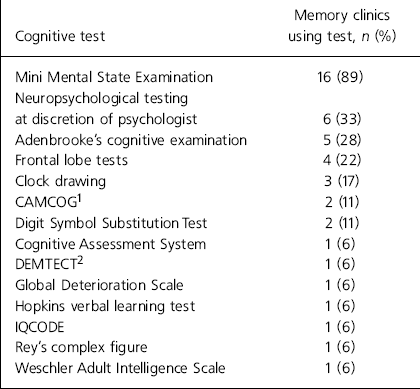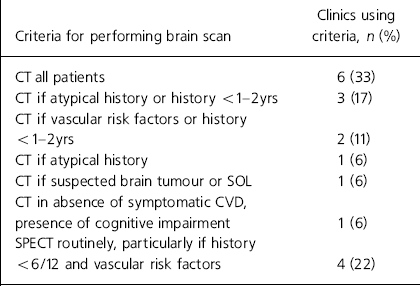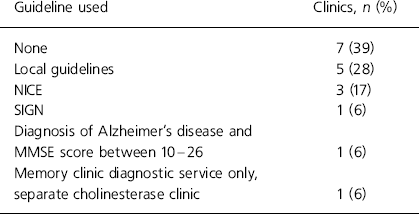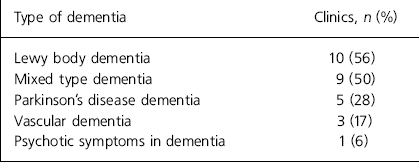The first memory clinic in the U.K was developed at St Pancras’ Hospital in 1983 (Philpot et al, 1987). Early memory clinics were few in number and tended to have a more academic focus (Reference Lindesay, Marudkar and Van DiepenLindesay et al, 2002). However, after the licensing of cholinesterase inhibitors, numbers increased sharply and they became a common component of mainstream old age psychiatric services (Reference Lindesay, Marudkar and Van DiepenLindesay et al, 2002). Some clinicians argue that by adopting this unnecessarily time consuming and rigorous model of assessment, valuable resources have been taken from other important areas of patient care (Reference Pelosi, McNulty and JacksonPelosi et al, 2006).
In Scotland, very little research has been conducted into memory clinic practice. The only previous UK studies are the first and second Leicester Surveys of Memory Clinic Practice (Lindesay et al, 1995, Reference Lindesay, Marudkar and Van Diepen2002). The first survey identified 20 clinics in the UK and the second identified 58; however, only 5 of these were in Scotland. This survey was conducted in order to update and add to information about the functioning of memory clinics in Scotland.
Method
The Royal College of Psychiatrists distributed a questionnaire on my behalf to all consultant old age psychiatrists who practice in Scotland (90 in total). The questionnaire asked the following questions:
-
• Do you have a memory clinic?
-
• Which department runs the memory clinic?
-
• Which disciplines are involved in the clinic?
-
• Who do you receive referrals from?
-
• Do you specify a pre-referral level of investigation?
-
• Who takes the clinical history?
-
• Who performs cognitive testing?
-
• Which cognitive tests do you perform?
-
• Who performs physical examination?
-
• Which routine investigations do you perform?
-
• What are your criteria for performing a computed tomography (CT) brain scan?
-
• Do you follow guidelines for the prescription of cholinesterase inhibitors?
-
• Do you prescribe cholinesterase inhibitors for other types of dementia?
-
• Do you prescribe memantine?
-
• What are your criteria for prescribing memantine?
-
• Do you feel your memory clinic is the most cost-effective way to assess and manage people with dementia?
-
• Do you conduct research or audit within your memory clinic?
Results
Replies
Of the 90 questionnaires distributed, 34 replies were received (38% response rate). At least one response was received from each mainland NHS board and further research established that none of the three island NHS boards (Western Isles, Orkney and Shetland) have a formal memory clinic.
Do you have a memory clinic?
Of the 34 clinicians who responded, 18 (53%) have an operational memory clinic and 16 do not. In the results that follow, numbers will also be given as a percentage of 18 (i.e. the total number of memory clinics identified).
Which department runs the memory clinic?
The majority of memory clinics are run by a consultant psychiatrist (n=16, 83%), 1 clinic is jointly run by psychiatry and the Department of Medicine for the Elderly (DOME), 1 by psychiatry, DOME and neuropsychology, and 1 exclusively by DOME.
Which disciplines are involved in the clinic?
All clinics have a consultant in old age psychiatry, 12 (67%) have a specialist nurse, 7 (39%) a staff grade, 6 (33%) a psychologist, 6 (33%) a senior house officer, 3 (17%) a geriatrician, 2 (11%) a specialist registrar, and 1 (6%) an Alzheimer Scotland support worker.
Who do you receive referrals from?
All clinics receive referrals from general practitioners, 15 (83%) from physicians, 8 (44%) from community psychiatric nurses, 3 (17%) from general adult psychiatry, 2 (11%) from neurology, and 1 (6%) from day-hospital nurses.
Do you specify a pre-referral level of investigation?
A total of 12 (67%) request that specific investigations/assessments are performed before they see patients at their memory clinic. These include bloods (n=10, 56%), electrocardiogram (ECG) (n=2, 11%) and specific cognitive tests (n=1, 6%). Overall, 6 (33%) clinics do not request any investigations before seeing the patient.
Who takes the clinical history?
In 14 (78%) clinics the history is taken by a psychiatrist, in 1 (6%) it is taken by a geriatrician, in 1 (6%) it is taken by a doctor or a nurse, and in 2 (11%) it is taken by any team member.
Who performs cognitive testing?
In 4 (22%) clinics cognitive testing is performed by a psychiatrist or a nurse, in 4 (22%) it is performed by a psychiatrist or a psychologist, in 3 (17%) it is performed by a psychiatrist only, in 2 (11%) it is performed by a nurse only, in 2 (11%) it is performed by a nurse or psychologist, in 1 (6%) it is performed by a nurse or an occupational therapist, in 1(6%) it is performed by a psychologist only, and in 1 (6%) it is performed by any team member.
Which cognitive test do you perform?
Table 1 shows which criteria are used in memory clinics operating in Scotland and how many clinics use each criterion.
Table 1. Criteria used in memory clinics in Scotland and number of memory clinics using these criteria

| Cognitive test | Memory clinics using test, n (%) |
|---|---|
| Mini Mental State Examination | 16 (89) |
| Neuropsychological testing at discretion of psychologist | 6 (33) |
| Adenbrooke's cognitive examination | 5 (28) |
| Frontal lobe tests | 4 (22) |
| Clock drawing | 3 (17) |
| CAMCOG1 | 2 (11) |
| Digit Symbol Substitution Test | 2 (11) |
| Cognitive Assessment System | 1 (6) |
| DEMTECT2 | 1 (6) |
| Global Deterioration Scale | 1 (6) |
| Hopkins verbal learning test | 1 (6) |
| IQCODE | 1 (6) |
| Rey's complex figure | 1 (6) |
| Weschler Adult Intelligence Scale | 1 (6) |
Who performs physical examination?
In 11 (61%) clinics the physical examination is carried out by a psychiatrist and in 3 (17%) it is performed by a geriatrician. The remaining 4 (22%) clinics do not conduct a physical examination.
Which routine investigations do you perform?
Overall, 15 (83%) clinics perform blood tests as part of their routine assessment, 11 (61%) perform a CT brain scan as routine, 9 (50%) perform routine ECGs and 1 (6%) clinic performs routine SPECT (single photon emission computed tomography) brain scans.
What are your criteria for performing a CT brain scan?
Table 2 lists the various criteria clinicians use for performing a brain scan on people who have been referred to their memory clinic.
Table 2. Criteria used for performing a brain scan on patients referred to a memory clinic

| Criteria for performing brain scan | Clinics using criteria, n (%) |
|---|---|
| CT all patients | 6 (33) |
| CT if atypical history or history < 1-2yrs | 3 (17) |
| CT if vascular risk factors or history < 1-2yrs | 2 (11) |
| CT if atypical history | 1 (6) |
| CT if suspected brain tumour or SOL | 1 (6) |
| CT in absence of symptomatic CVD, presence of cognitive impairment | 1 (6) |
| SPECT routinely, particularly if history < 6/12 and vascular risk factors | 4 (22) |
Do you follow guidelines for the prescription of cholinesterase inhibitors?
Table 3 demonstrates the criteria respondents use for the prescription of cholinesterase inhibitors.
Table 3. Criteria used for prescribing cholinesterase inhibitors and the numbers of memory clinics using these criteria

| Guideline used | Clinics, n (%) |
|---|---|
| None | 7 (39) |
| Local guidelines | 5 (28) |
| NICE | 3 (17) |
| SIGN | 1 (6) |
| Diagnosis of Alzheimer's disease and MMSE score between 10-26 | 1 (6) |
| Memory clinic diagnostic service only, separate cholinesterase clinic | 1 (6) |
Do you prescribe cholinesterase inhibitors for other types of dementia?
A total of 15 (83%) of clinics prescribe cholinesterase inhibitors for other types of dementia, 3 (17%) do not. Table 4 details the different types of dementia for which some clinicians prescribe cholinesterase inhibitors.
Table 4. Number of clinics prescribing cholinesterase inhibitors for types of dementia other than Alzheimer's disease

| Type of dementia | Clinics, n (%) |
|---|---|
| Lewy body dementia | 10 (56) |
| Mixed type dementia | 9 (50) |
| Parkinson's disease dementia | 5 (28) |
| Vascular dementia | 3 (17) |
| Psychotic symptoms in dementia | 1 (6) |
Do you prescribe memantine?
Overall, 5 (28%) clinics prescribe memantine, 13 (72%) do not.
What are your criteria for prescribing memantine?
The following criteria for prescribing memantine were given.
-
1. Clinical judgement but also accept local guidelines.
-
2. Individual patient basis for behavioural disturbance. which has failed to respond to standard treatment.
-
3. Individual cases decided by a committee.
-
4. Protocol:
-
a. early cases with significant cardiac/respiratory disease
-
b. add on in in-patients who have done well on cholinesterase inhibitors
-
c. those intolerant of cholinesterase inhibitors
-
-
5. Forth Valley consensus.
Do you feel your memory clinic is the most cost-effective way to assess and manage people with dementia?
Of the clinics surveyed, 15 (83%) believe their memory clinic is the most cost-effective way to assess and manage people with dementia, 2 (11%) do not and 1 (6%) is unsure.
Do you conduct research or audit within your memory clinic?
A total of 10 (56%) respondents conduct research and audit within their clinic and 8 (44%) do not.
Discussion
More than half of the consultant old age psychiatrists, practicing in Scotland, who responded to this survey have a memory clinic. Since only 38% of consultants responded, this figure may not be representative of the population as a whole. The study also shows that half of Scottish health boards have a memory clinic(s) within their service but it does not tell us how many clinics are within each region.
The majority of these clinics are run by old age psychiatrists but many other disciplines are involved including specialist nurses, staff grade doctors, psychologists, senior house officers, geriatricians, specialist registrars, neuropsychologists and charity support workers. Most referrals come from general practitioners and physicians but some come from colleagues within psychiatry and psychology. Two-thirds of the clinics request that some pre-referral investigations are carried out; the most commonly requested tests are blood tests. In most clinics the clinical history and physical examination are conducted by a doctor but in some clinics other members of the team perform these tasks. A wide variety of cognitive tests are performed but the Mini Mental State Examination is by far the most commonly used tool. The majority of patients who attend a memory clinic will have blood tests, an ECG and a CT brain scan performed. A third of clinics perform a CT brain scan on every patient who attends the clinic, some follow the Royal College of Psychiatrists’ guidance on CT scanning in patients with cognitive impairment (Royal College of Psychiatrists, 1995) and some use their own criteria. One clinic routinely uses SPECT scanning. Over a third of clinics do not use any formal criteria for the prescription of cholinesterase inhibitors, around a quarter use local guidelines, less than a fifth follow National Institute for Health and Clinical Excellence guidelines and only one clinic follows Scottish Intercollegiate Guidelines Network guidance. Cholinesterase inhibitors are frequently used for types of dementia other than Alzheimer's disease, most commonly Lewy body dementia and mixed type dementia. Around a quarter of clinics prescribe memantine and tend to follow local guidelines when doing so. Most of the respondents believe their memory clinic is the most cost-effective way to assess and manage people with dementia; however, there is an inherent bias in asking this question of those who already have memory clinics. Just over a half of respondents have active research and audit within their clinic.
Conclusions
Memory clinics are a common component of old age psychiatry services within Scotland. Across the country there is variability in which disciplines are involved in the clinic, assessment techniques and treatment approaches. Most clinicians appear to rely on their own clinical judgement rather than national guidelines when making decisions about investigations and the prescription of anti-dementia medications.
Declaration of interest
None.
Acknowledgements
I thank Dr Rob Gray and Dr Hilary Livingston, both of the Royal Alexandra Hospital, Paisley, for their help with this study.







eLetters
No eLetters have been published for this article.